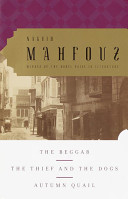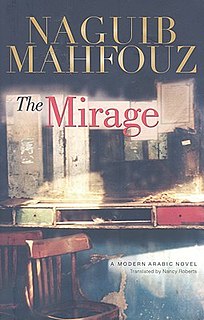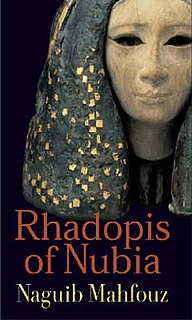 W
WAkhenaten, Dweller in Truth is a novel written and published by Nobel Prize-winning Egyptian author Naguib Mahfouz in 1985. It was translated from Arabic into English in 1998 by Tagreid Abu-Hassabo. The form and subject of the book is the basis for a cello concerto of the same title by Mohammed Fairouz.
 W
WArabian Nights and Days (1979) is a novel by Egyptian writer Naguib Mahfouz, winner of the Nobel Prize for Literature. The novel serves as a sequel and companion piece for One Thousand and One Nights and includes many of the same characters that appeared in the original work such as Shahryar, Scheherazade, and Aladdin.
 W
WThe Beggar is a 1965 novella by Naguib Mahfouz about the failure to find meaning in existence. It is set in post-revolutionary Cairo during the time of Gamal Abdel Nasser.
 W
WCarcase for Hounds is a novel by Kenyan writer Meja Mwangi first published in 1974. The novel concerns the Mau Mau liberation struggle during the latter days of British colonial rule and attempts, by the actions of the main protagonists, to show how Mau Mau was organized and why it took so long for the colonial government to defeat them. Carcase for Hounds received mixed reviews. The novel was also adapted into a movie by Ola Balogun, Cry Freedom.
 W
WChike and the River is a children's story by Chinua Achebe. It was first published in 1966 by Cambridge University Press, with illustrations by Prue Theobalds, and was the first of several children's stories Achebe would write. The latest reprint has a cover design by Victor Ekpuk.
 W
WThe City of Pleasure Arabic: مدينة اللذة is Ezzat el Kamhawi's first novel, and second book after It Happened in the land of Dust and Mud (stories). It was first released by the General Organization for Cultural Centers in 1997, second edition by el-Ain publishing in 2009. In his novel, Kamhawi attempted to personify an entire city where he deals with issues related to love and sex. The characters are portrayed as simple passerby who narrate the city's story and who live in it, with it and for it.
 W
WDangerous Love is a 1996 novel by Ben Okri set in Lagos of the 1970s. The novel is a reworking of an earlier book, The Landscapes Within. The book is more conventional and realist than Okri's previous works. The subject concerns love, corruption and memories of the Biafran War in Nigeria.
 W
WThe Day the Leader was Killed is a novel written and published by Nobel Prize-winning author Naguib Mahfouz in 1983.
 W
WThe Fall of the Imam is a novel by Egyptian writer Nawal El Saadawi published in Arabic in 1987. The English translation by the author's husband Sherif Hetata was published in 1988.
 W
WGod's Bits of Wood is a 1960 novel by the Senegalese author Ousmane Sembène that concerns a railroad strike in colonial Senegal of the 1940s. It was written in French under the title Les bouts de bois de Dieu. The book deals with several ways that the Senegalese and Malians responded to colonialism. The book casts a critical regard towards accommodation, collaboration, and overall idealization of the French colonials. At the same time the story details the strikers who work against the mistreatment of the Senegalese people. The novel was translated into English in 1962 and published by William Heinemann as God's Bits of Wood as part of their influential African Writers Series.
 W
WA Grain of Wheat is a novel by Kenyan novelist Ngũgĩ wa Thiong'o first published as part of the influential Heinemann African Writers Series. It was written while he was studying at Leeds University and first published in 1967 by Heinemann. The title is taken from the Gospel According to St. John, 12:24. The novel weaves together several stories set during the state of emergency in Kenya's struggle for independence (1952–59), focusing on the quiet Mugo, whose life is ruled by a dark secret. The plot revolves around his home village's preparations for Kenya's independence day celebration, Uhuru day. On that day, former resistance fighters General R and Koinandu plan on publicly executing the traitor who betrayed Kihika.
 W
WThe Guard is Ezzat el Kamhawi's third novel, and sixth book, released by el-Ain publishing in 2008.
 W
WThe Harafish is a 1977 novel written by Naguib Mahfouz. It comprises a series of episodes in a dozen generations of a family from the Egyptian urban rabble. Many of the members of this family become clan chiefs in an alley in the city; some of them are benefactors to the other members of the harafish; some are more corrupt. Neither the location within Egypt nor the time of the events is ever identified.
 W
WHouse of the Wolf is Ezzat el Kamhawi's fourth novel and eighth book. It was first released in Arabic language in 2010 by Dar Al-Adab in Beirut.
 W
WIgbo Olodumare as is a mystery novel written by Daniel O. Fagunwa. Considered the second novel written in the Yoruba language, after its predecessor Ògbójú Ọdẹ nínú Igbó Irúnmọlẹ̀ and one of the first to be written in any African language, it was first published in 1949 and is Daniel O. Fagunwa's second novel. It is a prequel to his first book and details the adventures of Olowo-Aye, father of the protagonist in "Ogboju Ode ninu Igbo Irunmole."
 W
WLokotown and Other Stories is a collection of nine short stories by Nigerian author Cyprian Ekwensi, published in 1966 as the 19th volume in the African Writers Series. Looking at Nigerian city life, his stories show excitement and dissolution.
 W
WThe Mirage is a 1948 Egyptian novel by Naguib Mahfouz. The novel was filmed as al-Sarab by Anwar al-Shinawi. Mahfouz has said that it is a personal novel based on his upbringing.
 W
WThe money-order with White genesis is a book containing two novellas by Senegalese author Ousmane Sembène, first published in French in 1966. An English-language translation was published in 1972. It tells two stories. In White Genesis, a mother struggles with conflict after her teenage daughter's pregnancy becomes apparent. In The Money-order, a man receives a money-order from a relative living in Paris.
 W
WÒgbójú Ọdẹ nínú Igbó Irúnmọlẹ̀ is a 1938 novel by D.O. Fagunwa. It was the first full-length novel in Yoruba, and was one of the first novels to be written in any African language. It contains the picaresque tales of a Yoruba hunter whose name is Akara-ogun (Compound-of-spells) and one of the formidable hunters of a bygone age, who encountered folklore elements, such as magic, monsters, ghommids, spirits, and gods. It was followed by a sequel, Igbo Olodumare which was actually a prequel to the book and discusses the tales of Olowo-Aiye, father of Akara-Ogun.
 W
WOne Man, One Matchet was written by Nigerian author T. M. Aluko and published in 1964 as the 11th book in the Heinemann African Writers Series. The novel tells the story of a community in Western Nigeria during the end of the colonial period and beginning of independence. Set in a small community where the majority of the inhabitants are dependent on the revenue from their cocoa crops, the story looks at the role of the semi-literate Benjamin Benjamin in the small community.
 W
WThe Open Door is a 1960 novel by Egyptian writer Latifa al-Zayyat. It won the inaugural Naguib Mahfouz Medal for Literature. The novel, written in colloquial Egyptian Arabic explores a middle-class Egyptian girl's coming of age, against the background of the growing Egyptian nationalist movement before the 1952 Egypt revolution. The book was made into a 1963 Egyptian film directed by Henry Barakat with Faten Hamama, Mahmoud Moursy, and Saleh Selim.
 W
WPeople of the City is the debut novel of Cyprian Ekwensi first published in 1954 by Andrew Dakers Ltd. The novel was a predecessor to a number of other city novels in the Nigerian tradition.
 W
WRhadopis of Nubia is an early novel by the Egyptian writer Naguib Mahfouz. It was originally published in Arabic in 1943. An English translation by Anthony Calderbank appeared in 2003 published by American University in Cairo Press. The novel is one of several that Mahfouz wrote at the beginning of his career, with Pharaonic Egypt as their setting. Others in this series of novels include Khufu's Wisdom (1939) and Thebes at War (1944). All have been translated into English and appeared in one volume under the title Three Novels of Ancient Egypt.
 W
WThe Slave Girl is a 1977 novel by Nigerian writer Buchi Emecheta that was published in the UK by Allison and Busby and in the US by George Braziller. It won the Jock Campbell Award from the New Statesman in 1978. The novel was Emecheta's fourth book; it was dedicated to her editor Margaret Busby.
 W
WStarbook, subtitled "A Magical Tale of Love and Regeneration", is a 2007 novel by Nigerian poet and novelist Ben Okri.
 W
WThebes at War is an early novel by the Egyptian writer Naguib Mahfouz. It was originally published in Arabic in 1944. An English translation by Humphrey Davies appeared in 2003. The novel is one of several that Mahfouz wrote at the beginning of his career, with Pharaonic Egypt as their setting. Others in this series of novels include Khufu's Wisdom (1939) and Rhadopis of Nubia (1943). All have been translated into English and appeared in one volume under the title Three Novels of Ancient Egypt.
 W
WThe Translator is Sudanese writer Leila Aboulela's first novel, published in 1999. The Translator is a story about a young Muslim Sudanese widow living in Scotland without her son, and her blooming relationship with a secular Scottish Middle Eastern scholar. The novel takes place in both Khartoum and Aberdeen and was inspired partially by Aboulela's own experience moving between these two places. Aboulela refers to the novel and the main character Sammar as "a Muslim Jane Eyre". The novel focuses on issues of faith, cross-cultural romance, and the modernization of Sudan.
 W
WTwo Thousand Seasons is a novel by Ghanaian novelist Ayi Kwei Armah. The novel was first published in 1973 and subsequently published a number of times, including in the influential Heinemann African Writers Series. It is an epic historical novel, attempting to depict the last "two thousand seasons" of African history in one narrative arc following a Pan-African approach.
 W
WXala is a 1973 novel by Ousmane Sembène, that was later translated and published in English in 1976 as part of the influential Heinemann African Writers Series. It is about El Hadji Abdou Kader Beye, a businessman who is struck by impotence on the night of his wedding to his third wife.